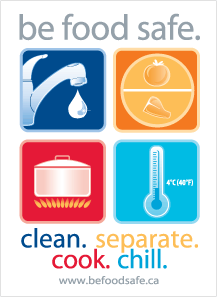KEEP A CLEAN AND SAFE KITCHEN
•Wash fruits and vegetables in a clean sink with running water
•Use hot, soapy water to clean hands, utensils, dishes,
nonporous cutting boards and countertops before handling food AND in between
tasks when handling different foods.
•Use bleach solution on cutting boards (1 capful/2L water)
•Ensure hands are clean and free of cuts/bandages before
handling food
•Mix foods with utensils, not hands; keep hands away from
mouth, nose, hair
•Wash or replace kitchen towels/sponges regularaly
AVOID CROSS-CONTAMINATION
•Wash all surfaces that have been in contact with raw meats,
poultry, eggs, fish and shellfish before resuing
•Separate raw foods from those that have been cooked
•Serve foods on clean plates, NOT the plate that you used to transfer the raw meat to the BBQ
•Don’t use leftover marinade that was in contact with raw
meat for sauces/basting (this is a HUGE pet peeve of mine at BBQ’s), instead,
marinate your meat in ¾ of the sauce, and reserve an extra ¼ to to place on the
cooked meat right before serving
KEEP HOT FOODS HOT
•When cooking meats or poultry, use a thermometer to check
the internal temperature making sure the thermometer is inserted into the
thickest part of the meat. Always make sure meats are cooked thoroughly
•Do not cook large portions of meat in the microwave as it
will often results in uneven cooking with some parts left uncooked
KEEP COLD FOODS COLD
•When running errands, leave your grocery shopping for the
last stop, you don’t want to leave perishable foods (milk products, meat
products) in a car any longer than necessary
•Marinate meats
in the refrigerator,
•Defrost meats in the refrigerator, NEVER on the counter. It’s
best to take out frozen meat the night before and place on a plate or in bowl
in fridge to avoid raw juices from spilling all over the place. If you absolutely
must speed up the defrosting time, place meat in Ziploc bag and run under cold
(NOT HOT) water just before cooking.
IN GENERAL
•Do not taste food that is suspect – If in doubt, throw it
out
•Throw out foods that have suspicious odors, but keep in
mind the dates on packages of prepared foods and mark the day that leftovers
were put in the refrigerator – some food poisoning bacteria are odorless,
colorless and tasteless. Another huge pet peeve of mine, THE BEST BEFORE DATE ON THE PACKAGE ONLY REFERS TO THE UNOPENED PRODUCT. Example, if you have a container of sour cream, once you open that container the best before date means nothing and the product shelf life is drastically different!!!!!! Same goes for yogurt tubs, milk, boxed lettuce, hummus etc.
check out Stilltasty.com for an extensive and accurate list of opened and unopened product shelf life
•Do not buy items that have broken seals or packaging
•Follow label instructions for storing and preparing
packaged and frozen foods
Safe & Happy Cooking!

No comments:
Post a Comment